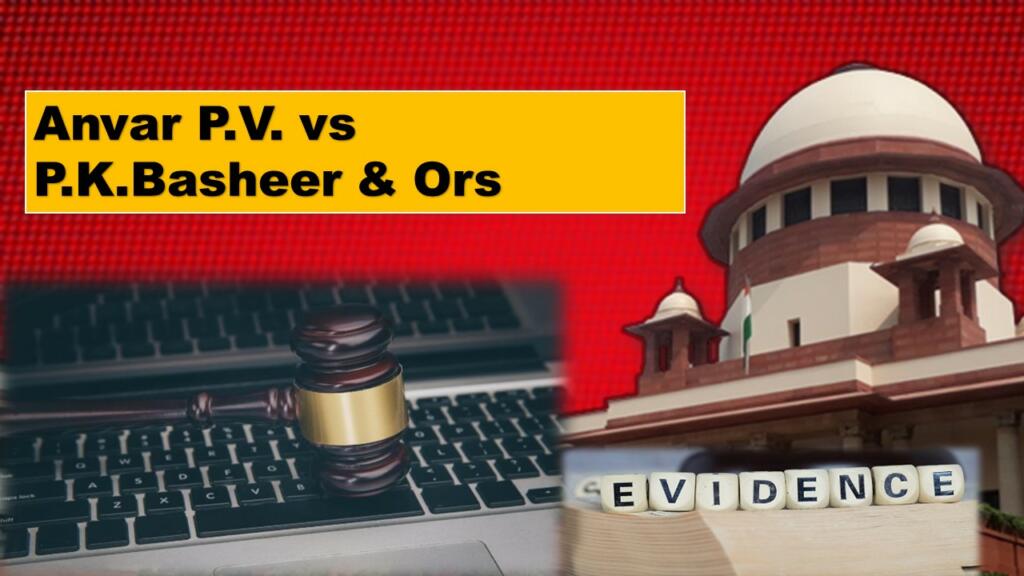Anvar PV vs PK Basheer & Ors: Electronics are the backbone of our society. With society, the law also evolves. The onset of the electronic revolution and the pace at which it changes often puts the legal system in a jiffy. It is really tough to keep up with an ever-changing world. A clear-cut guideline always seems on the horizon. The biggest problem is related to the relevancy, admissibility, and acceptability of electronic evidence.
History of electronic evidence in India
Electronic evidence is an example of documentary evidence. Before 2000, electronic evidence mainly consisted of tape recordings and videography. Even these two types of evidence were not considered much reliable. The procedure outlined in Sections 61 to 65 of the Indian Evidence Act (IEA) guided their admissibility in Indian courts. The guidelines can be termed ‘loose,’ since a specific certificate from an expert regarding the truthfulness of the evidence was not compulsory.
Things changed after the passing of the IT Act of 2000. The act mandated the insertion of two new sections, namely 65A and 65B, in the Indian Evidence Act. The Act paved the way for the admission of electronic evidence in all civil and criminal cases in India. 65A was given a special subheading, namely, ‘Special provisions as to evidence relating to an electronic record.’ On the other hand, Section 65B was put under ‘Admissibility of electronic records.’
Also read: Preamble: Evolution from a Loosely Worded Guideline to an Iron-Tight Principle
65B contained sub-section 4. It sets guidelines for the courts to authenticate the evidence. This is necessary since, with changing times, everyone, including judges, can’t keep up with the new distortions in the electronic world. Sub-section 4 makes it mandatory to obtain an attestation from a responsible official, generally an IT professional. The professional certifies the particular details of the device, the manner in which evidence was collected, and other minute technical stuff.
Afzal Guru Case and its overruling
The requirement of certification came into question in the State (N.C.T. of Delhi) vs. Navjot Sandhu case, also known as the Afzal Guru or Parliament attack case. In this case, the Apex Court held that there is no bar to citing secondary evidence under sections 63 and 65 of the IEA. In electronic evidence, secondary evidence simply means xerox or any other copy of an original file. Effectively, the Apex Court said that certification under Section 65B(4) was not mandatory.
Also read: The most iconic Indian case ever: 1973, Kesavananda Bharati vs. State of Kerala, Part 5.
It was overruled in the Anvar PV vs PK Basheer & Ors. case. The Anvar PV vs PK Basheer & Ors case was related to a politician wanting to set aside the election of the winner of the Ernad legislative assembly seat. His contention was that an intentionally defamatory article was published by the eventual winner, which decreased his chances of winning the election. The High Court refused his appeal, so he approached the Supreme Court.
In the Apex Court, famous lawyer Kapil Sibbal raised questions about the veracity of the evidence itself. He argued that the electronic evidence was not in consonance with 65b of IEA. There was also a CD produced by the appellant. Kapil Sibbal said that it was not primary evidence and did not satisfy the conditions laid down in Sections 65A and 65B.
The Apex Court agreed with these contentions and held the CD as inadmissible evidence since it did not fulfil the conditions of Section 65B. In their opinion, the then Chief Justice, Justice R.M. Lodha, Justice Kurien Joseph, and Justice Rohinton Fali Nariman also reiterated some guidelines regarding electronic evidence.
Also read: The 1995 case that cemented the notion that “Hinduism is a way of life” and why it is not right.
Court’s observations on electronic evidence
The Apex Court said that electronic evidence is documentary evidence under Section 3 of the IEA. Ruling out the Court’s opinion in the Afzal Guru case, the Apex Court made it mandatory to cross checkpoints mentioned in Section 65B of the IEA. The Apex Court referred to the Latin phrase generalia specialibus non derogant. It means special law will always prevail over general law.
Since 65B was enacted as a special law, it would always take precedence over previously established Sections on electronic evidence. In case of any other provision contradicts the provisions laid down in 65B, the Court determined that 65B will prevail. These kinds of clauses are termed ‘non-obstante clauses.’
The Anvar PV vs PK Basheer & Ors case cleared a lot of air regarding that. However, a smaller bench overruled it in Shafi Mohammad’s case. The confusion created due to it paved the way for another 2020 judgement regarding the same.
Support TFI:
Support us to strengthen the ‘Right’ ideology of cultural nationalism by purchasing the best quality garments from TFI-STORE.COM
Also Watch:
https://www.youtube.com/watch?v=5yBFu_06_lM
